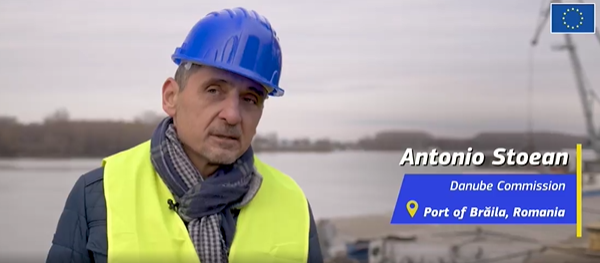The Danube Commission continues to find solutions to improve existing IWT logistics and the traffic on the Lower Danube
The Secretariat of the Danube Commission continues to be actively involved in finding solutions to facilitate/improve of existing IWT logistics and the traffic in the ports on the Lower Danube. The actions undertaken in the past months tackle main bottlenecks and administrative barriers in order to increase the cargo flow of agricultural products. The DC has had numerous meetings with the EC, representatives of Romanian, Ukrainian and Moldovan state authorities as well as other stakeholders and has carried out visits to the Danube ports. During the past few months, activities within EU-Ukraine Solidarity Lanes have resulted in tangible results, such as:
- Increase of the number of vessels on the Sulina canal as a result of a series of measures to increase the number of pilots, the improvement in coordinating the UA and RO authorities, the streamlining of the work of the various authorities and the increase of their resources.
- Support to an investment project for navigation aids for the Sulina canal funded by EC/DG GROW, which shall facilitate navigation at night and bad weather conditions.
- Improvement of the capacity of the border crossing point Orlivka – Isaccea which is served by a ferry complex operating now a high number of trucks on a daily basis.
- Establishment of container liner services operated by Trading Line from October 2022 onwards on Reni – Constanta; Izmail – Constanta transporting humanitarian cargo, grains and general cargoes. with future plans on the port of Guirgiulesti (MD).
- Establishment of a second inspection team at the Galati border crossing point; solutions to simplify formalities for dangerous cargo vessels, container and livestock vessels, empty convoys; clarification of issues with phytosanitary and veterinary certificates.
- Due to repair of the broad-gauge railway connection, the ports of Galati and Braila were able to carry out transhipments of grain cargoes, 40% being Ukrainian cargoes in summer 2022. Certain Romanian port operators have allocated terminals and silos for transshipment of Ukrainian grain.
- Opening of the Berezino-Besarabyaska railway station, connection of which was restored with the support of EU-Ukraine Solidarity Lanes, which currently provides connection between the Danube ports of Ukraine and the port of Giurgiulesti.
- Bi-weekly situation reports on the Danube and seaports in the region were produced and a contact and information point (“Danube Cargo Information Desk”) was established and operated to facilitate inland waterway cargo flows by connecting market actors and matching cargo demand with port and fleet operator services.
Future endeavours include preparations for a green (deep sea) port in Sulina which would allow the handling of Handymax vessels at Sulina being connected by the Danube ports by emission free inland barges. This project has an important dimension for triggering green energy provision and distribution as well as regional development for Sulina and Tulcea county. The service could increase the competitiveness of grain exports from the hinterland of the ports on the Lower Danube in Romania, Moldova and Ukraine.
Between May 2022 and 20 January 2023, more than 17.8 million tons of Ukrainian grain and related products have been transported through the Solidarity Lanes. More than 30% of Ukrainian grain exports pass through the Danube (according to the USPA analysis). In June 2022 – January 2023, 3.4 million tons of Ukrainian cargo arrived in Constanta by barge.
The activities of the EU-Ukraine Solidarity Lanes will actively continue in 2023 and will be spread not only on grain export from Ukraine, but also on import of important commodities – diesel, livestock, humanitarian cargo, and other export goods ![]()

